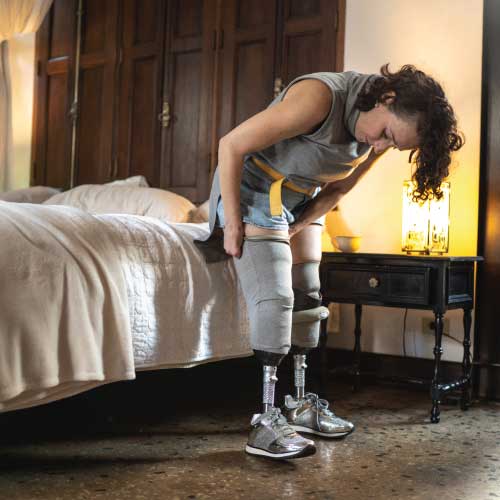Pakistani Startup Delivers Prosthetic Limbs to Child Survivors in Gaza
In a rush? Read the summary:
Bioniks, a Karachi-based startup, is transforming prosthetic care by delivering affordable, 3D-printed limbs to child amputees in Gaza. Using a remote-fitting process, Bioniks customizes lightweight, durable prosthetic arms for children like Sidra Al Bordeeni, who lost her limb in conflict. The limbs are designed in Pakistan and fitted virtually in Jordan, providing mobility and emotional support to young survivors. This scalable model blends humanitarian aid with accessible tech, offering hope to children in war zones and beyond.
———
Reading Time: 4 minutes
In a world where war often steals futures, a Pakistani startup is quietly rebuilding them, one limb at a time.

Bioniks, a Karachi-based social enterprise, is changing lives by providing affordable, 3D-printed prosthetic limbs to child amputees in Gaza. Their work marks a rare cross-border humanitarian effort, where innovation meets compassion, and where mobility is restored to those who’ve lost it far too young.
A Long-Distance Lifeline
Since 2021, Bioniks has been active in Pakistan, providing over 1,000 customized upper-limb prosthetics funded by corporate sponsorships, donations, and patient payments. Their foray in Gaza marks their first international effort, and it’s already making a tangible difference.
Eight-year-old Sidra Al Bordeeni lost her arm in an Israeli missile strike. For over a year, she was unable to do things she loved, like riding her bike. Now, with her new prosthetic arm, Sidra is back on her bike, rediscovering her childhood and the freedom it brings. In a Reuters interview, her mother described the transformation as remarkable: Sidra’s confidence has returned, and her siblings and friends are amazed at the prosthetic arm.
Sidra’s experience with her new prosthetic exemplifies Bioniks’ goal—to restore not only function but also dignity and childhood.
Bioniks’ Design Process
What makes Bioniks’ approach unique is its remote fitting system. Young patients, like Sidra, typically undergo several days of remote consultations and virtual fittings. This process involves capturing images of the residual limb from different angles using a smartphone. A software then processes these images to generate a 3D model, which is used to print a custom prosthetic in Pakistan.
Once completed, the prosthetic is shipped to Jordan, where trained staff, in coordination with Bioniks’ team, fit the child via video call.
Affordability and Function
Bioniks prosthetic arms cost around $2,500, significantly less than the $10,000 to $20,000 for more advanced U.S.-made devices. While they lack some high-end features, Bioniks’ creations are practical, lightweight, and durable. These limbs are ideal for children, offering mobility and comfort without unnecessary complexity.
Another notable key feature is the ability to customize designs; children can select colors and themes, such as Disney’s Elsa or Marvel’s Iron Man. This personalization isn’t just aesthetic—it encourages children to take pride in their prostheses, reducing feelings of self-consciousness. For children who lose limbs due to conflict or injury, this emotional reassurance can be just as important as the physical benefits.
Scaling Compassion Through Innovation
While Gaza marks the startup’s first deployment in a war zone, Bioniks CEO Anas Niaz has bigger plans. He told Reuters during his first trip to Amman that he aims to expand the company’s reach to assist more children worldwide. And their process is definitely scalable: Bioniks designs its prosthetic limbs so that key components can be swapped out cheaply while keeping the rest of the device intact, making it suitable for growing children.
During that Amman trip, Niaz also delivered Sidra’s prosthetic personally and oversaw fittings for other young patients, including three-year-old Habebat Allah, who lost both arms and a leg in the same conflict. With Bioniks’ help, she is now on the path to regaining some independence that most toddlers take for granted.
Why This Matters
Through this effort, Bioniks is showing the world that remote fitting is possible, prosthetics can be accessible even in places without clinics or specialists, and designing prostheses with the user’s mental health in mind improves usage and acceptance.
This initiative highlights the importance of inclusive innovation. Whether you’re a parent of a child living with limb loss or an adult seeking improved care, Bioniks’ approach offers hope that the future of prosthetic care can be more compassionate, affordable, and within reach.
Related Readings:
Hope for Gaza’s Forgotten Amputees
Prosthetic Leg: To Cover or Not to Cover?
Plastic Bottles Are Being Upcycled Into Low-Cost Prosthetic Limbs










































































